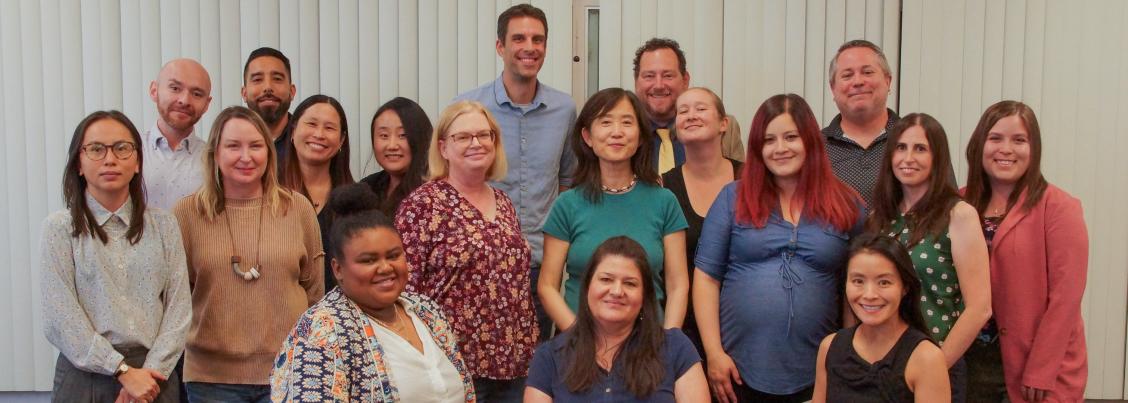
Biography
Education
- Ph.D 1998, San Diego State University & University of California, San Diego Joint Doctoral Program (Clinical Psychology)
- M.A. 1993, San Diego State University (Psychology)
- B.A. 1991, San Diego State University (Psychology)
Specialty Areas: Gerontology, Neuropsychology and Clinical Psychology.
Courses Taught
- PSY 320/L - Statistical Methods in Psychological Research & Lab
- PSY 321/L – Experimental Psychology and Lab
- PSY 310- Behavioral Disorders
- PSY 655 – Field Work (Clinical Master's Option)
Selected Publications and Presentations
*Nakhla, M. Z., *Banuelos, D., Pagán, C., *Gavarrete Olvera, A., & Razani, J. (2021). Differences between episodic and semantic memory in predicting observation-based activities of daily living in mild cognitive impairment and Alzheimer’s disease. Applied Neuropsychology: Adult, 1-12. doi:10.1080/23279095.2021.1893172
*Avila, J.F., Verney, S.P., *Kauzor, K., *Flowers, A., *Mehradfar, M. and Razani, J. (2018). Normative data for Farsi-speaking Iranians in the United States on measures of executive functioning. Applied Neuropsychology: Adult, 9, 1-7. doi: 10.1080/23279095.2017.1392963.
*Avila, J., *Flowers, A., *Scott, T., Quilici, J., Apostolova, L. G., Woo, E., Ringman, J., Razani, J. (2015). Daily Activity Abilities in MCI, Alzheimer’s Disease and Healthy Controls. Geropsych: The Journal of Gerontopsychology and Geriatric Psychiatry, 28(4), 191-200.
Razani, J., *Corona, R., Quilici, J., *Matevosyan, A., *Funes, C., *Larco, A., *Miloyan, B., Chung, J., Goldberg, H., & Lu, P. (2014) The Effects of Declining Functional Abilities in Dementia Patients and Increases Psychological Distress on Caregiver Burden Over a One-Year Period. Clinical Gerontologist, 37, 235-252.
Bortnik, K.E., Boone, K.B., Wen, J., Lu, P., Mitrushina, M., Razani, J., Maury, T. (2013). Survey results regarding use of the Boston Naming Test: Houston, we have a problem. Journal of Clinical and Experimental Neuropsychology, 35, 857-66.
*Miloyan, B., Razani, J., *Larco, A., *Avila, J., & Chung, J. (2013). Aspects of Attention Predict Real-World Task Performance in Alzheimer’s Disease. Applied Neuropsychology: Adult, 20, 203-210.
Byrd, D., Razani, J., *Suarez, P., *Lafosse, J., Manly, M. & Attix, D. K. (2010). Diversity Summit 2008: Challenges in the Recruitment and Retention of Ethnic Minorities in Neuropsychology. The Clinical Neuropsychologist, 24, 1279-1291.
Razani, J., *Bayan, S., *Funes, C., *Mahmoud, M., *Torrence, N., *Wong, J., Alessi, C., Josephson, K. (2010). Pattern of Deficits in Daily Functioning and Cognitive Performance in Patients with Alzheimer’s Disease, Journal of Geriatric Psychiatry and Neurology, 24, 23-32.
Razani, J., Nordin, S., Chan, A., Murphy, C. (2010). Semantic Networks for Odors and Colors in Alzheimer's Disease. Neuropsychology, 24, 291-299.
Razani, J., *Wong, J., *Dafaeeboini, N., Edwards-Lee, T., Lu, P., Alessi, C., & Josephson, K. (2009). Predicting Everyday Functional Abilities of Dementia Patients with the Mini Mental State Exam. Journal of Geriatric Psychiatry and Neurology, 22, 62-70.
Razani, J., *Kakos, B., *Orieta-Barbalace, C., *Wong, J., *Casas, R., Lu, P., Alessi, C., & Josephson, K. (2007). Predicting Caregiver Burden From Daily Functional Abilities of Patients with Relatively Mild Dementia. Journal of the American Geriatric Society, 55, 1415-1420.
Razani, J., *Casas, R., *Wong, J., Lu, P., Alessi, C., & Josephson, K. (2007). The Relationship Between Executive Functioning and Activities of Daily Living in Patients With Relatively Mild Dementia. Applied Neuropsychology, 14, 1-7.
Razani, J., *Burciaga, J., *Madore, M., & *Wong, J., (2007). Effects of culture on tests of attention and information processing in an ethnically diverse group. Archives of Clinical Neuropsychology, 22, 333-341.
Boone, K. B., Victor, T., *Wen, J., Razani, J., & Ponton, M. (2007). The association between ethnicity and neuropsychological scores in a large patient population. Archives of Clinical Neuropsychology,22, 355-365.
Razani, J., *Murcia, G., *Tabares, J., & *Wong, J. (2006). The Effects of Culture on WASI Test Performance in Ethnically Diverse Individuals. The Clinical Neuropsychologist, 5, 1-13.
Mitrushina MN, Boone K, Razani, J., D’Elia LF (2005). Handbook of Normative Data For Neuropsychological Assessment, 2nd Edition. New York: Oxford University Press.
Razani, J., Boone, K., Lesser, I., Weiss, D. (2004). The effects of demographic and health-risk factors on cognitive performance in older adults. American Journal of Geriatric Psychiatry, 12, 404-411.
Lu, P., Boone, K., Jimenez, N., Razani, J. (2004). Failure to Inhibit the Reading Response on the Stroop Test: A Pathognomonic Indicator of Suspect Effort. Journal of Clinical and Experimental Neuropsychology,26, 180-189.
Feil, D., Razani, J., Boone, K., and Lesser, I. (2003). Apathy and cognitive performance in older adults with depression. International Journal of Geriatric Psychiatry, 18,1-7.
Nordin, S., Razani, L.J., Markison, S. and Murphy, C. (2003). Age-associated increases in intensity discrimination for taste. Experimental Aging Research, 29, 371-382.
Reger, M., Welsh, R., Razani, J., Martin, D., Boone, K. (2002). A Meta Analysis of the neuropsychological sequelae of HIV infection. Journal of the International Neuropsychology Society, 8, 410-424.
Boone, K.B., Salazar, X., Lu, P., Warner-Chacon, K., Razani, J. (2002). The Rey-15 item recognition trial: A technique to enhance sensitivity of the Rey 15-item Memorization Test. Journal of Clinical and Experimental Neuropsychology, 24(5), 561-573.
Sherman, D.S., Boone, K.B., Lu, P., Razani, J. (2002). Re-examination of Rey Auditory Verbal Learning Test/Rey Complex Figure discriminant function to detect suboptimal effort. The Clinical Neuropsychologist, 16(3), 242-250.
Razani, J., Boone, K., Miller, B. L., Lee, A., & Sherman, D. (2001). Neuropsychological Performance of Right- and Left-Frontotemporal Dementia Compared to Alzheimer’s Disease. Journal of the International Neuropsychology Society, 7, 468-480.
Boone, K., Swerdloff, R. S., Miller, B. L., Geschwind, D. H., Razani, J., Lee, A., Gaw Gonzalo, I., Haddal, A., Rankin, K., Lu, P., & Paul, L. (2001). Neuropsychological profiles of adults with Klinefelters Syndrome. Journal of the International Neuropsychology Society, 7, 448-455.
Razani, J., Murphy, C., Davidson, T. M., McCutchan, A., and Grant, I. (1996). Olfactory Sensitivity is impaired in HIV-positive cognitively impaired patients, Physiology and Behavior, 59, 877-881.
Barron, S., Razani, J., Gallegos, R., and Riley, E. (1995). The effects of neo-natal alcohol exposure on saccharin preference. Alcoholism: Clinical and Experimental Research, 19 (1), 257-261.
Research Interests
My research primarily focuses on neuropsychological functioning in patients with various forms of dementia and healthy individuals from varied cultural backgrounds. An overview of the current projects is provided below. Undergraduate and graduate students are welcome (and encouraged!) to participate in all aspects of a project, including literature review, data collection, data entry, statistical analyses, and dissemination of the findings in conference presentations and/or journal publications.
Neuropsychological Patterns of Performance in Individuals With Dementia. Alzheimer's disease (AD) is one of the most prevalent of the neurodegenerative disorders. Currently, the diagnosis of AD can only be definitively made upon autopsy. However, medical examinations combined with a thorough cognitive assessment can provide diagnoses of Probable or Possible AD during a person's life. Thus, our understanding of the "cognitive profile" of individuals with AD is critical in aiding diagnosis as well as better understanding brain-behavior relationships. The purpose of this project is to better delineate AD from the other forms of dementia, such as the various forms of frontotemporal dementia, vascular dementia and late-life psychosis, by documenting the specific cognitive domains that are affected in AD with use of conventional neuropsychological tests.
Students administer neuropsychological test batteries to patients with various forms of dementia at CSUN or in medical centers such as Harbor-UCLA Medical Center or at the UCLA Neuropsychiatric Institute. They will also assist in scoring the test results and help to enter data into a computer database. Students choosing to participate in this project will have the rare opportunity to work with interesting patients suffering from various, in some cases rare, forms of dementia, and gain experience in a medical center setting.
Neuropsychological Test Performance and Its Correlates with Everyday Functioning. The purpose of this study is to better understand the relationship between cognitive test scores and everyday functional ability in patients with dementia. That is, how does an individual with severely poor memory test performance behave or carry out his/her daily activities? What specific daily problems does an individual have who scores low on information processing speed tests? How does an individual who has problems with reasoning and judgment carry out his/her daily activities? These are important questions for which we currently have very little information available. Students choosing to work on this project will aid in administering cognitive test batteries to normal individuals as well as to patients with various types of dementia. Depending on their interest level, students can also assist with database maintenance, data analyses and presentation of the findings.
Development of Normative Neuropsychological Test Scores for Different Ethnic Groups. Normative data, by which an individual's clinical test scores can be compared in order to assess strengths and weakness, are only beginning to emerge for most standard neuropsychological tests. However, these norms are primarily gathered on samples of Caucasian individuals and very little information is available for individuals from diverse ethnic backgrounds. As a result, assessing the performance of such individuals remains a challenge. The purpose of this project is to gather more comprehensive normative data, particularly for ethnically diverse populations, for standard cognitive test batteries. Students can participate in all levels of research on this project, including administering neuropsychological tests to healthy individuals from diverse backgrounds that range in age from young to late adulthood, maintaining a database of scores and presenting findings at conferences or in journal articles.




